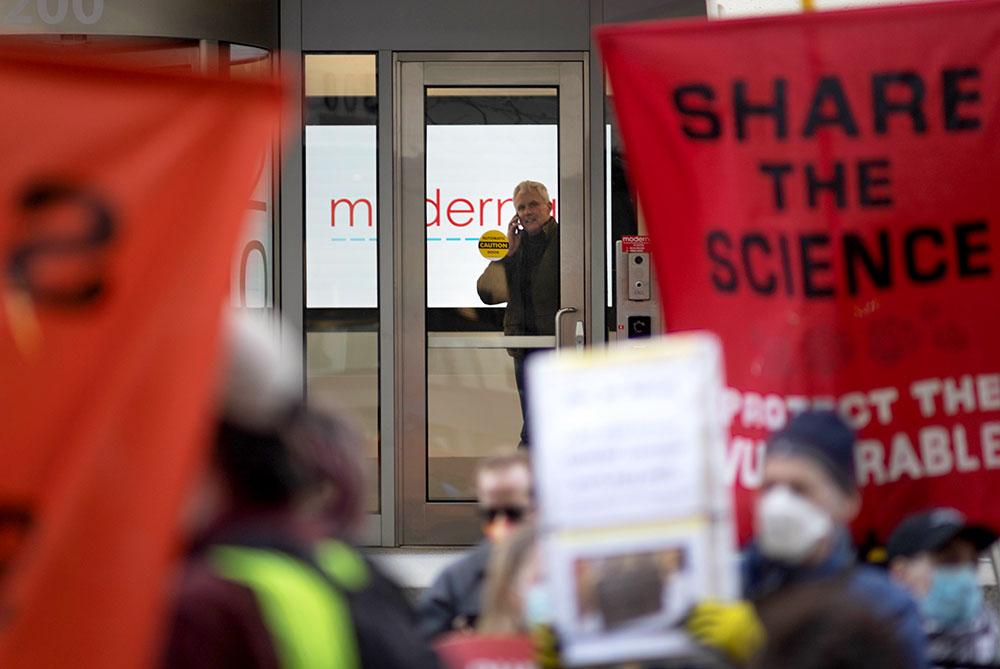
Protestors gathered at Moderna’s headquarters in Cambridge April 28 calling for pharmaceutical companies to “Share the Science” of vaccine production with countries still experiencing the challenges of the COVID-19 pandemic.
A large number of protestors marched from Galaxy Park in Kendall Square to Moderna’s headquarters on the day of the pharmaceutical company’s annual shareholder meeting. The demonstration was organized by Massachusetts Peace Action, People’s Action and the Justice Is Global activist group.
“They cannot continue to profit while low and middle-income countries still do not have access to the COVID-19 vaccines,” the event notice read.
Many Boston University students were present for the demonstration, including members of the Young Democratic Socialists of America.
Max Dahlstrom — a junior in the College of Arts and Sciences and one of YDSA’s action coordinators — said the group brought around 25 members to participate in the rally.
“We’re calling attention to vaccine inequity and the role that Moderna has played in manufacturing this disparity between countries,” Dahlstrom said at the protest. “The goal of scientists and health advocates should be to get everybody vaccinated and protect our health, not to make profits.”
A small number of counter-protesters were also present throughout the demonstration. One counter-protester chanted “COVID is a hoax” and “Vaccines are poison” through a megaphone.
Another counter protester, David Ajemian, said international aid to low-income countries should address problems besides vaccine distribution.
“I think we should be focusing on other initiatives in the third world, like anti-poverty efforts,” Ajemian said.
In 2021, Moderna declined to provide support to the World Health Organization-backed mRNA “technology transfer hub” based in South Africa. The hub aimed to recreate existing COVID-19 vaccines and to train manufacturers from low- and middle-income countries to produce them.
While the “technology transfer hub” successfully created its own version of the vaccine based on Moderna’s blueprint, the effort took multiple months, leading critics to claim that Moderna’s — and other major pharmaceutical companies — lack of commitment cost the lives of countless people in poorer countries.
In a statement earlier this year, Moderna CEO Stéphane Bancel wrote that the company’s abilities in global vaccine distribution are limited by its size, but Moderna has plans in place — including doubling manufacturing — to make its vaccine more accessible around the world.
“We believe our strategy is comprehensive, but if more is needed and we are unable to deliver more without undermining our current commitments, we will continue to add pillars to our strategy until this pandemic is over for all,” Bancel wrote.
As part of its plan to increase vaccine distribution, Moderna plans to open its own vaccine production facility in Africa, according to the statement
Tian Johnson — founder and lead strategist of the nonprofit African Alliance — said without sharing information about vaccine technology, Moderna’s plans will not make a difference in combating global vaccine inequity.
“Moderna can open a factory on every single street corner of this continent, it will come to nothing,” Johnson said in an interview. “As long as they hold the tech, they hold the know-how, we’re still going to be stuck in the same colonialist situation.”
Unlike Pfizer, Moderna has pledged to not enforce its vaccine patent against companies manufacturing vaccines for 92 low- and middle-income countries including Afghanistan, Haiti and Uganda.
Jorge Contreras, professor of law at the University of Utah, said Moderna should be positively recognized for its pledge not to legally punish labs that copy their vaccine.
“Of all the companies who are involved in this space, Moderna has actually been the most generous one with its intellectual property rights,” Contreras said in an interview.
Maaza Seyoum — Global South Convenor for the People’s Vaccine Alliance and a speaker at the demonstration — said the Moderna rally was in solidarity with the protest at the Pfizer commercial headquarters in the United Kingdom held on the same day, and other international protests.
“It really gives power to people to see that there is interest, that folks care in the United States about vaccine equity,” Seyoum said in an interview. “And I think it’s important that people like the CEO of Moderna, the CEO of other big pharmas like Pfizer, know that the world is watching.”
The protestors in Cambridge concluded their demonstration by collectively lying down on the street in front of Moderna while the organizers took photos. A few demonstrators remained standing and taped posters dedicated to people who died from COVID-19 onto the building’s exterior wall.
Amir Mohareb, a participant of the protest, said public demonstrations that garner press attention remain necessary as companies with life-saving technologies continuously refuse to share them.
“We’ve asked nicely. They’ve said no. We have to ask in other ways,” Mohareb said.
Grants & Awards Chair Alexia Nizhny, president of Boston University’s Young Democratic Socialists of America student organization, was one of the organizers of the protest. She was not involved in the editing of this article.



















































































































